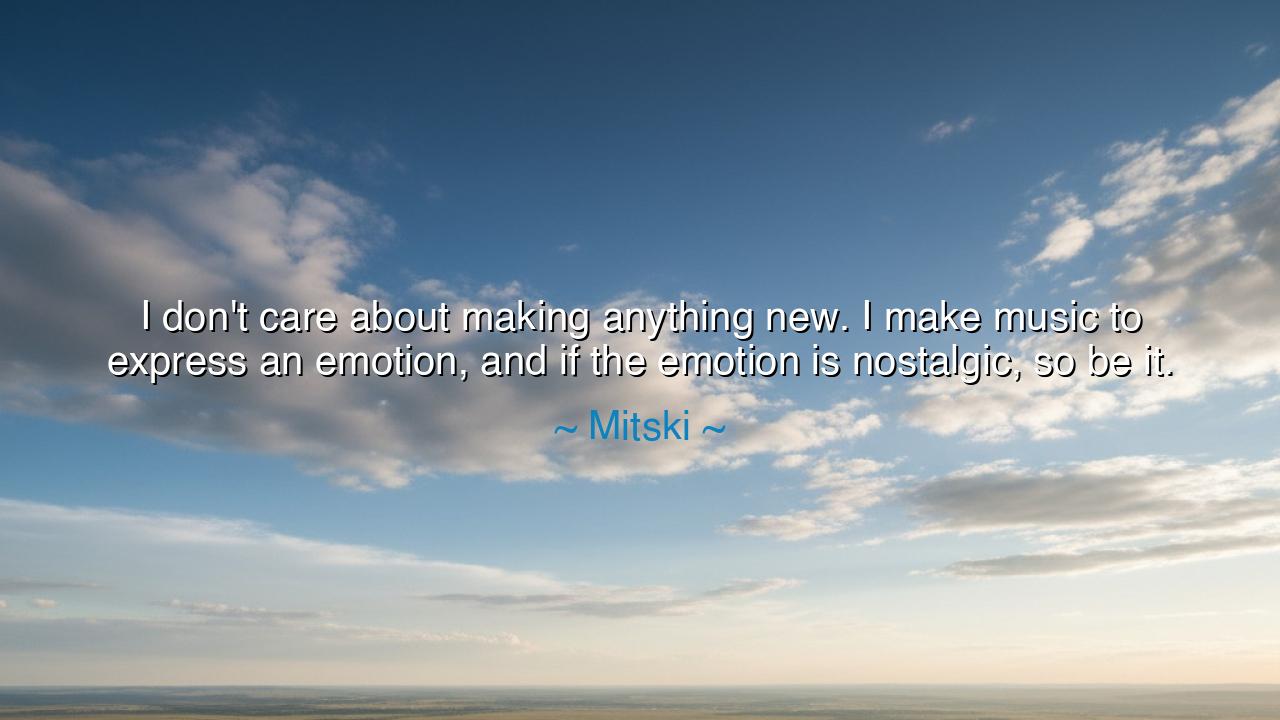
I don't care about making anything new. I make music to express
I don't care about making anything new. I make music to express an emotion, and if the emotion is nostalgic, so be it.






Hear now, children of the present and heirs of the future, the words of Mitski, the singer who pours her soul into song. She declares: "I don't care about making anything new. I make music to express an emotion, and if the emotion is nostalgic, so be it." In these lines, the spirit of art is revealed, not as a contest of invention, but as a vessel of truth. The artist does not wrestle with time to be first or last; rather, she seeks to breathe the heart’s unspoken flame into form. For what is music, if not the voice of the soul translated into sound? And what is nostalgia, if not the ancient echo of feelings that once burned bright, returning to remind us we are still alive?
The ancients understood this well. When Homer sang of Achilles’ rage, did he seek to be novel? No, he sought only to express an emotion so great it could topple kingdoms and pierce the hearts of men across centuries. The poet does not chase novelty, but truth; the sculptor does not shape marble for originality, but for revelation. Mitski’s words carry this wisdom into our time: it is not the “newness” of the work that matters, but the authenticity of the feeling it conveys. To seek only novelty is to chase shadows; to seek expression is to carve eternity.
Consider the story of the Roman general Scipio Africanus. When he stood upon the smoking ruins of Carthage, he wept. His soldiers, bewildered, asked why victory brought tears. Scipio answered that he felt nostalgia for Troy, a city long destroyed, and feared Rome too would one day fall. His sorrow was not new; it was the same lament that has echoed since the dawn of civilizations: all that rises will one day perish. In that moment, the general was not inventing a new emotion, but voicing an ancient one. And yet, because it was true, it moved those who heard him. Thus, the eternal power of expression surpasses the fleeting sparkle of invention.
Mitski reminds us that to create art—or to live fully—is not to run from the past, but to embrace it. If the emotion that arises is rooted in longing, in memory, in the sweetness of days gone by, then let it be so. To suppress this in the name of novelty is to betray one’s own heart. Nostalgia is not weakness; it is a bridge between what we have been and what we still yearn to become. It is the hearth-fire where memory and hope sit side by side, whispering to us that life has meaning beyond the present hour.
And so, the lesson is this: do not be enslaved by the false idol of originality. The world will whisper to you that only the “new” is worthy. Resist this temptation. The truest path is to speak with honesty, whether your voice is ancient or fresh, whether your heart beats with sorrow or joy. When you create, when you love, when you work—do not ask, “Is this new?” but ask, “Is this true?” For truth is the flame that endures when novelty has turned to dust.
Practical wisdom follows: when you write, do not fear echoes of those before you; when you sing, do not fear melodies once sung; when you live, do not fear the patterns of generations past. Instead, lean into emotion. Keep a journal of your deepest stirrings, and honor them even when they seem repetitive. Speak words of love, even if they echo the voices of your ancestors. Create art, even if its roots are entwined with tradition. In doing so, you honor both your soul and the timeless river of humanity.
For the wellspring of human feeling does not run dry, nor does it need to be “new.” It needs only to be honest, and in its honesty lies its immortality. As the oak tree rises from the same soil as countless others, yet grows uniquely toward the sun, so too shall your own voice rise from the fertile ground of emotions shared across the ages. Thus spoke Mitski, and thus I pass on this teaching: do not fear nostalgia; do not fear repetition. Fear only the silence of a heart that dares not speak.






AAdministratorAdministrator
Welcome, honored guests. Please leave a comment, we will respond soon